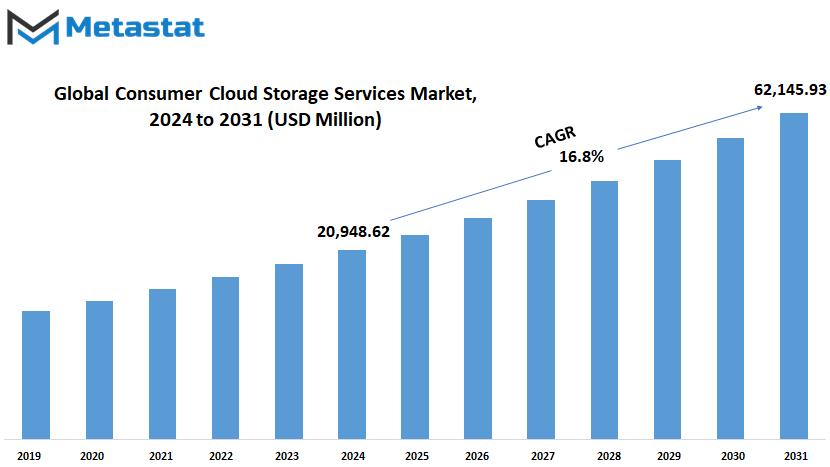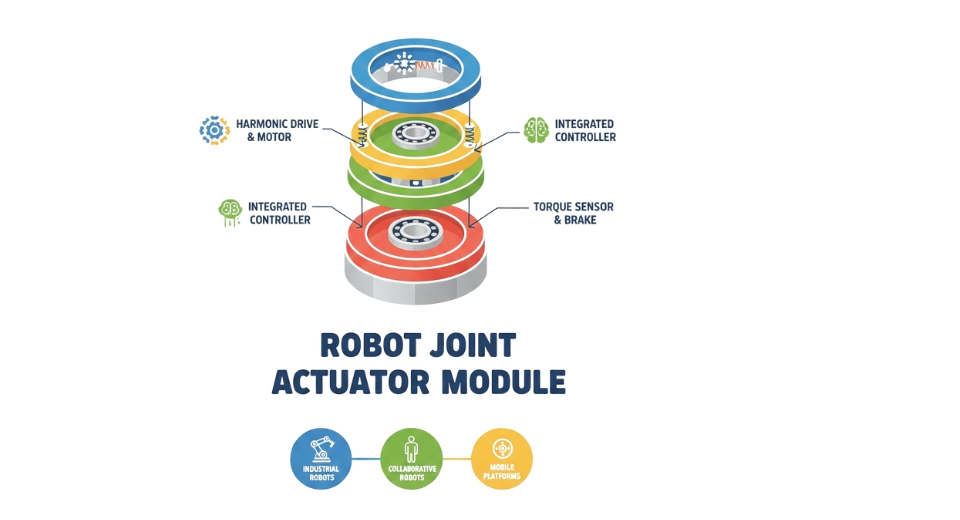MARKET OVERVIEW
The Global Consumer Cloud Storage Services market is going to be the game-changer for digital data storage around the world. This kind of industry is focused around offering a chance to internet users to store, administer, and access their personal data from the internet that eliminates the need for one to store all his personal data on physical devices such as disks. With digital content creation, media consumption, and the need to easily access data across numerous devices, cloud storage is a vital part of the lives of millions of consumers. The Global Consumer Cloud Storage Services market will only grow as more users sign up for cloud-based solutions for a variety of reasons.
One of the factors that is driving this shift is the growing use of the internet to access content, store files, and share information. The increasing need for consumers to manage large amounts of personal data such as photos, documents, videos, and music is met by cloud service providers through scalable and accessible storage. These services will become increasingly integral to how individuals interact with their digital files in the future. Continuous innovation in cloud technology will influence the scope of this market as service providers introduce new features, enhanced security protocols, and seamless integration across devices.
Cloud storage is not only a safe place to store data but will also help individuals back up important files, thus safeguarding their data in case a device fails or gets lost. As digital lifestyles become increasingly connected, cloud storage solutions will become more intelligent and effective for users to access and manage their data on the move. This is because services will be created according to the specific needs of each consumer, for instance, for storing large amounts of high-resolution photographs or a library of video recordings. Furthermore, advancements in artificial intelligence and machine learning will be infused into the cloud storage system. They will make cloud storage much smarter in file organization and faster in searching files while making it much more intuitive for users to operate the system. This would enable cloud storage services to take on AI-driven features of predicting and suggesting what is to be done based on user behavior.
Another significant factor shaping the future of cloud storage services would be the increasing concern of data security and privacy. Providers will need to develop their security features continually so that consumers have confidence and comply with evolving regulations from different regions. The cloud storage services will include such features as end-to-end encryption, two-factor authentication, and advanced access control systems, protecting sensitive information while stored in the cloud.
The Global Consumer Cloud Storage Services market will also be determined by aspects such as accessibility and experience. More cloud storage consumers will lead to increased competition among providers; this is likely to provide more economical pricing models, flexible storage options, etc. Besides, the experience of usage will be easier, including mobile applications; people can access their information at any time and location, via smartphones, tablets, or computers. This market will probably experience this integration of cloud storage into other digital platforms to become more streamlined in handling their personal content and files over time.
Global Consumer Cloud Storage Services market is estimated to reach $62,145.93 Million by 2031; growing at a CAGR of 16.8% from 2024 to 2031.

GROWTH FACTORS
The Global Consumer Cloud Storage Services market is constantly growing, and several factors driving this growth are a manifestation of the changing dynamics of data storage and management among consumers. One of the main drivers of this growth is the increased usage of smartphones and IoT devices. The increasing dependence on these technologies for day-to-day tasks also fuels a need for cloud storage services that offer users smooth accessibility of data from any source. Cloud storage offers easy access to consumers' files, photos, and videos across various devices, therefore forming a necessary component in the digital life of the day. What this new cloud storage provides today to the ever-moving set is easily accessible and flexible- data that is available when wanted, and that sums it all.
Another most driving factor in the direction to the expansion of market sales is the growing importance regarding consumer awareness about importance aspects of data security solutions with backup. As people store more personal and sensitive information online, the need for reliable and secure cloud storage options has become more pronounced. Consumers are now more conscious of the risks of losing their data, whether due to device failure or accidental deletion. This awareness has led to increased demand for cloud storage services that offer robust security features, such as encryption and backup options. This motivates more individuals to choose cloud storage as their favorite data management solution, given the reassurance of knowing that their data is secure and easily recoverable.
However, some challenges might limit the market's growth. One major concern has been the issue of data privacy and security. Many consumers still fear the security of their personal data stored in the cloud despite improvements in encryption and security protocols. Cloud service providers have, in the past, been victims of security breaches and data leaks, creating mistrust among potential users. This could slow the adoption of cloud storage services, especially in regions with strict privacy regulations.
Another barrier to widespread adoption is the high dependency on stable internet connectivity, especially in underprivileged regions with less reliable internet access. A cloud storage solution requires a stable and consistent internet connection to function effectively. Users might face issues uploading, downloading, or accessing their files without such a connection, which would discourage them from using cloud storage solutions completely.
Despite all these challenges, the future seems bright for the Global Consumer Cloud Storage Services market. The integration of AI-driven tools for storage optimization and file retrieval is one of the key developments that may revolutionize the user experience. These advancements will not only make cloud storage more efficient but also offer consumers more capabilities, such as faster search and better organization of their data. This technology, being new, will continue to have further developments that bring newer opportunities for growth in the market, encouraging more and more consumers to put trust and use cloud storage solutions.
MARKET SEGMENTATION
By Deployment Mode
The Global Consumer Cloud Storage Services market is evolving with flexible and scalable solutions that allow businesses and individuals to store massive data without hassle in this domain. Due to growing reliance on the digital platforms for the data storage, accessibility, and sharing over the years, the demand for cloud storage had increased at a tremendous level. The most critical factor driving this growth is the variety of deployment options in the market, which caters to the diversified needs of consumers and organizations. As cloud storage technology evolves, the market will likely become more segmented and specialized to cater to the growing demands for privacy, efficiency, and performance.
The Global Consumer Cloud Storage Services market is classified into three main categories on the basis of deployment mode: Public Cloud, Private Cloud, and Hybrid Cloud. Each one of the above-mentioned types of deployment models carries distinct advantages based upon the actual need of a user or organization. Public Cloud is the most popularly sought solution in the market, and most individual consumers and small organizations prefer to use public clouds.
It is cloud infrastructure that is third-party managed, such as through Amazon Web Services (AWS), Google Cloud, or Microsoft Azure. Public cloud services are mainly cost-effective and easy to scale, and thus highly attractive to most. These solutions provide features such as file synchronization, backup, and sharing-all from almost any point on the globe. Public cloud storage will become highly sought after as the robustness and security of cloud infrastructure become enhanced. Private Cloud is intended for companies or organizations with strong security needs and which take their data privacy issues seriously. This model is used when cloud storage is deployed on a company's own infrastructure or by a third party offering dedicated resources.
Private cloud services allow businesses to be more independent in terms of control and flexibility in their data needs, making them very ideal in sectors such as finance and healthcare, where the most critical aspect is the need for data protection.
Private cloud storage will be highly in demand as the regulations are getting even stricter about how data privacy is treated. Finally, Hybrid Cloud is growing in popularity because, with it, a firm can benefit from the most beneficial offerings of both public and private cloud services. It thus offers flexibility in terms of data storage by integrating on-premise infrastructure with public resources. Hybrid cloud solutions are a method of managing cloud services for businesses while offering them control over their sensitive data while at the same time experiencing the advantages of public cloud services. With this in mind, more organizations are likely to implement the hybrid model in future in search of a middle course between security, flexibility, and cost efficiency.
With increasing improvement in cloud technology, demand for data storage solutions which provide flexibility, security, and performance, the Global Consumer Cloud Storage Services market is expected to continue to expand in the following years.
By Type of Storage
The Global Consumer Cloud Storage Services market will surely continue to grow since every individual and business rely extensively on cloud solutions for data storage. Moving forward, the industry will see vast development as well as diversification because of the variety of offered storage types. At the moment, there are basically three types of cloud storage services: file storage, block storage, and object storage. Every kind has a purpose for serving and will, undoubtedly change in ways to help with usability, speed, and access.
File storage is probably the most well known, and most intuitive cloud type for most users, due to the familiarity in its method of storing information into files, like computer or external drive files. It provides a clean way to manage documents, photos, and videos - that's why it may suit personal use and small-sized business needs. The future use of remote work and distance collaboration will increase the dependence on file storage. Any developments in the future concerning this service will definitely extend better file synchronization.
Block storage is often used for more complex applications, such as those required by databases or virtual machines. File storage divides data into smaller chunks, known as blocks. Each block is stored separately, and they can be managed individually. This type of storage is crucial for businesses that require quick access to large amounts of data. Block storage will continue to evolve toward providing higher performance and scalability for businesses, which are increasing their loads of data to levels that could be overwhelming in nature.
Object storage is fast becoming the favorite among enterprises for managing large volumes of unstructured data such as multimedia files or backups. Object storage stores data in discrete units called objects. An object has both the data itself and metadata that can help retrieve data efficiently. This type of storage is suitable for large-scale storage needs and is commonly used by businesses and service providers. Object storage will continue to grow in capacity and capability, allowing even larger datasets to be stored at faster speeds. Improvement in metadata management and retrieval systems will make it even more efficient and reliable for personal and business use.
With regard to Global Consumer Cloud Storage Services market, it can therefore be concluded that diversity among different types of storages being provided will continue in the Global Consumer Cloud Storage Services. Every file storage, block storage, and object storage has a transformation into technological progression. These technologies create different types of demands within growing data storage and management sectors, which will therefore see consumer and business clients availing more efficient, scalable, and user-friendly services related to storage in these advancing technologies.
By Storage Capacity
The Global Consumer Cloud Storage Services market has been developed to the fullest over the last few years, and technology has also changed the way we go about storing and accessing our data. Cloud storage services facilitate the storage of data online using virtual devices such as digital hard drives instead of hardware-based devices. It becomes so important when most move to digital lifestyles. People are currently managing every act with smartphones, tablets, and computers. The global market for these services is wide and its nature, especially with regard to storage capacity differentiated in many ways. Global Consumer Cloud Storage Services can be segmented based on many kinds of storages capacities and can be analyzed as given below: Less than 100 GB; 100 GB to 1 TB; more than 1 TB.
All these categories will absorb diverse needs among consumers and would tend to expand as more and more are using digital storage for keeping their pictures, documents, music, and videos. There is bound to be greater growth in cloud storage, not less, since data volume, or so people go, keeps surging sky high. Less than 100 GB will also experience gigantic demand as it cannot be expected that every other user might want much storage capacity. This will be primarily used by those users who are mostly left with almost only documents, some small files, and very few pictures or videos.
Now, as people are turning towards cloud storage for everything - from backup data on devices to huge collections of media files to business applications - the requirement for storage ranging between 100 GB to 1 TB is expected to skyrocket.
This category focuses on users that require space though they do not really require high capacity. This more than 1 TB segment is likely to grow the most in the Global Consumer Cloud Storage Services market. This is because consumer-created data will continue to build and pile up with increased qualities of videos, games, or large files needed for any work or personal project in the near future due to technology's growth and continuous improvement. Most users will need more than 1 TB of space for personal or professional purposes.
The Global Consumer Cloud Storage Services market has bright prospects ahead. People will rely more and more on the cloud to store data, so in the future, the demand for greater storage capacity will increase. It is evident that, as the technology improves, the cloud storage will play an important role in how people will manage their data for years to come.
By End Users
One of the most rapidly growing sectors is Global Consumer Cloud Storage Services. Over time, the need for digital storage solutions has been continuously rising all over the world. This has made cloud storage a necessity for people and organizations alike. This is because it enables secure storage of large amounts of data and easy access from any location. The market, however is especially influenced by how various end-users adopt these services. They are individual users, small businesses, educational institutions, among others.
Going forward, the individual user will remain to dominate a good share of the market’s growth. More and more data personal like photos, videos, and documents are going to find their way into the computer; thus, there is the need for more space to store all these. Convenience and easy access, besides high reliability, are some advantages brought forth by shifting to cloud-based storage. Increased competition amongst the providers of service is a significant factor that helps consumers at their individual levels and avails cheaper and rich-featured cloud storage facilities. People increasingly using their mobile devices or other handheld gadgetry and accumulating enormous volumes of data would require ever-higher amounts of personal cloud storage.
Very small businesses are also an important segment of the future of the Global Consumer Cloud Storage Services market. Such businesses often lack the finances to maintain their own infrastructure for storage. Thus, cloud storage offers an economically viable solution to the requirements of these small businesses concerning data storage and management. In the future, these tiny businesses will increasingly depend upon cloud services for scalability as well as flexibility. As the demand for more advanced cloud tools and applications increases, these businesses will adopt services that not only store their data but also offer enhanced features, such as collaboration tools and data backup.
Educational institutions are another key user group. In the coming years, cloud storage will become a critical part of the education sector as more schools and universities transition to digital learning environments. Teachers and students will be using cloud storage for the sharing of resources, collaborating on projects, and safely storing their work. Institutions will be able to take advantage of the flexibility that cloud storage solutions offer so that they can easily scale their storage needs based on changes in student enrollment and curriculum. With the increasing use of digital tools, demand for cloud storage in education will most likely increase.
Other groups, such as governmental organizations, non-profits, and large enterprises, will also fuel growth in the market. Because the world is becoming increasingly interconnected and data-driven, these groups will rely on cloud storage services to store, manage, and share huge datasets securely. The future of the Global Consumer Cloud Storage Services market will be driven by the ongoing demand for secure, accessible, and flexible data storage solutions tailored to the needs of a diverse set of end-users.
|
Forecast Period |
2024-2031 |
|
Market Size in 2024 |
$20,948.62 million |
|
Market Size by 2031 |
$62,145.93 Million |
|
Growth Rate from 2024 to 2031 |
16.8% |
|
Base Year |
2022 |
|
Regions Covered |
North America, Europe, Asia-Pacific Green, South America, Middle East & Africa |
REGIONAL ANALYSIS
The global market for consumer cloud storage services is experiencing significant growth, as more and more people around the world are relying on cloud solutions to store their data. Cloud storage is fast becoming an essential tool for managing and protecting data as businesses and individuals increasingly turn to digital platforms. This demand will further lead to increased growth of the global consumer cloud storage services market in developing as well as emerging economies as more customers seek easier access to safe, scaleable, and accessible means of storage solutions. Key factors propelling this expansion include rapid penetration of internet connectivity; growth in demand for storage solutions; a growing increase in usage of online services among others.
The market for consumer cloud storage is distributed across different geographical regions, which have their own trends and growth drivers. North America leads the market due to the presence of key players and a highly developed digital infrastructure. The U.S. is particularly leading the adoption of cloud storage as businesses and consumers alike utilize cloud solutions for personal and professional needs. Canada and Mexico, though smaller in comparison, also contribute to the overall growth of the market in North America, as more consumers seek cloud storage for ease of access and data management.
Countries in Europe, such as the UK, Germany, France, and Italy, are ahead of the curve in the adoption of cloud storage services. The region is marked by mature markets, including the UK and Germany, as well as emerging markets where the adoption of cloud is gaining momentum. The increasing use of cloud-based solutions for data security, collaboration, and file sharing will continue to drive the market in this region.
Asia-Pacific is one of the fastest-growing regions for the global consumer cloud storage services market. Countries like China, Japan, India, and South Korea are seeing a rise in demand for cloud storage services. As the digital economy grows and mobile phone usage continues to soar, consumers in these countries are increasingly turning to cloud storage for backup solutions and easy access to their data. E-commerce, social media services, and other online offerings would also help the industry growth rate increase in coming years.
Countries in South America, including Brazil and Argentina, are also not too far behind in gaining stable cloud storage adoption pace. Although the region is still in the early stages compared to North America and Europe, with increased internet penetration and an interest in cloud-based solutions, it is expected to expand the market significantly in the future. Meanwhile, in the Middle East and Africa, countries such as the GCC nations, Egypt, and South Africa begin to embrace cloud storage services, and increasing investments in infrastructure and digital solutions will further spur growth.
In conclusion, the global consumer cloud storage services market is likely to continue expanding across all regions, influenced by technological advancements, increasing volumes of digital data, and the need for safe and flexible storage solutions. As consumers' preferences change and the pace of digital transformation intensifies, the future for the cloud storage market is promising with ample opportunities for old players as well as new entrants.

COMPETITIVE PLAYERS
It is a highly competitive segment wherein the leading players still strive to innovate for an advanced future of digital storage solutions. As cloud storage evolves with increasing demand, individual as well as commercial customers seek efficient, secure, and accessible platforms for the storage of their data. Giants driving the growth include Google Drive, Apple iCloud, and Microsoft. Each of them boasts a unique blend of features and services that cater to diverse user needs. Not only do they compete with one another but also set the trends that will define future digital storage.
For example, Google Drive is very known for being seamless with other Google services and therefore popular among individuals and professional users. The company’s ability to provide a user-friendly experience with generous storage plans ensures it remains in the top race. Likewise, Apple’s iCloud service is closely aligned with the Apple ecosystem. That is a pretty convenient option for users who wish to make backup and sync their files across various devices. A smooth interface, along with high security standards, has been an advantage, particularly for those who are invested in the use of other Apple products.
Microsoft is another leading provider of cloud storage. Through its OneDrive, Microsoft presents solutions that suit integration with Office 365 and, therefore, provides a good offer for businesses as well as users. A hybrid cloud also attracts clients who need the implementation of on-premises as well as in-cloud solution. Meanwhile, Amazon, with its Amazon Drive and AWS, still represents a strong competitor, but one that not only supports individual consumers but also businesses seeking more robust cloud infrastructure and services.
Other players, like MediaFire, Tresorit, and pCloud, have different strengths in terms of security, privacy, and pricing. Tresorit emphasizes end-to-end encryption for users who prioritize data security. pCloud offers lifetime storage options and generous free plans, so it is a good fit for the broadest audience. Sync.com and MEGA focus on privacy as well, offering secure, encrypted cloud storage that can compete with the bigger names in the industry.
More variety is offered by players such as Salesforce, Dropbox, Box Inc., IDrive, Koofr, and OpenDrive. They cater to businesses and individuals, offering features like collaboration tools, advanced security, and backup solutions. In this scenario, with growing competition, these companies will innovate and adapt to continue changing the direction of the Global Consumer Cloud Storage Services market for years to come. In the future, we can expect even more integrations, better security measures, and advanced features to cater to the growing needs of users worldwide.
Consumer Cloud Storage Services Market Key Segments:
By Deployment Mode
- Public Cloud
- Private Cloud
- Hybrid Cloud
By Type of Storage
- File Storage
- Block Storage
- Object Storage
By Storage Capacity
- Less than 100 GB
- 100 GB to 1 TB
- More than 1 TB
By End Users
- Individual Users
- Very Small Businesses
- Educational Institutions
- Others
Key Global Consumer Cloud Storage Services Industry Players
- Google Drive
- Apple iCloud
- Microsoft
- MediaFire
- Tresorit
- Amazon
- pCloud
- Sync.com
- MEGA
- Salesforce
- Dropbox
- Box Inc.
- IDrive
- Koofr
- OpenDrive
WHAT REPORT PROVIDES
- Full in-depth analysis of the parent Industry
- Important changes in market and its dynamics
- Segmentation details of the market
- Former, on-going, and projected market analysis in terms of volume and value
- Assessment of niche industry developments
- Market share analysis
- Key strategies of major players
- Emerging segments and regional growth potential








 US: +1 3023308252
US: +1 3023308252






